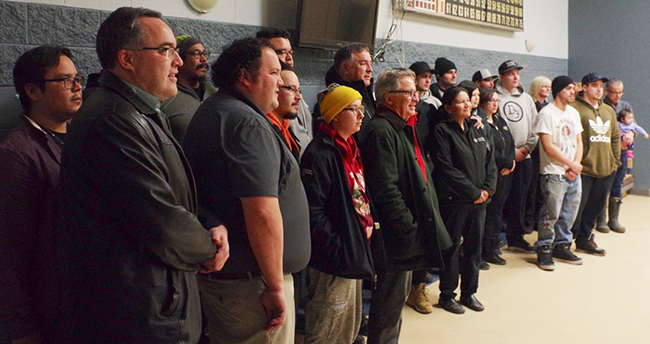SuperCom funding announcement sees jobs for 244 people

By Rick Garrick
FORT WILLIAM FIRST NATION – The provincial government recently announced an investment of more than $240,000 to help support SuperCom Industries LP’s job training initiative for up to 244 Indigenous people.
“I hope it lays down a good strong foundation to help our young people move in the right direction on many different fronts,” says Fort William Chief Peter Collins during the Jan. 29 announcement at the Fort William First Nation Community Centre. “This is a step in the right direction and it shouldn’t have taken this long. What we take from this today is an opportunity to move forward and change the path for our young people.”
Indigenous Relations and Reconciliation Minister David Zimmer says the investment, which was made through Ontario’s Indigenous Economic Development Fund, is part of about $850,000 that the provincial government is investing in economic development for First Nations in and around the Thunder Bay area.
“It includes a set aside of $240,000 to SuperCom Industries to support the training of 250 members in six First Nation communities,” Zimmer says. “The training is to ensure that community members are ready for the employment opportunities that will be related to the construction of the East-West Tie Transmission Project. The transmission project will ensure future growth in Ontario’s north.”
SuperCom is a 100 per cent First Nation-owned business that was created by Fort William, Red Rock Indian Band, Pays Plat, Biigtigong Nishnaabeg, Pic Mobert, Michipicoten and Supercom Industries Ltd., a general partner corporation owned by the six communities, to maximize economic and employment opportunities from the East-West Tie Transmission Project, which is a 230 kV transmission line that will connect the Wawa Transmission Station to the Lakehead Transmission Station near Thunder Bay.
“What this is all about is helping First Nations participate as equals in the economic opportunities that are available, that should be available and that First Nations have a right to participate in,” Zimmer says. “Chief Collins and the other chiefs from the participating First Nations have been real drivers behind this.”
The successful trainees will acquire trade skills that are transferable to other full-time employment opportunities, including maintenance of the transmission line once the project is complete.
“This investment will help expand job opportunities for numerous First Nations communities in Ontario, and will help ensure continued development and growing prosperity in the province’s north,” Zimmer says. “These grants are part of Ontario’s commitment to work closely with First Nations partners so they can fully nurture the talent and economic opportunities in their communities. This is an important step in Ontario’s journey to reconciliation and will create a better future for everyone in this province.”
SuperCom used the $240,000 investment to hire a training coordinator and six training advisors, one for each of the six participating First Nations.
“They were able to engage with upwards of 500 members across the region,” says Red Rock Indian Band Councillor Matthew Dupuis, who is a board member with SuperCom. “The whole idea behind the SuperCom training initiative was that if everyone who is willing to put the time and the work into it, they could achieve any level of employment.”
Dupuis says the first stage of the training initiative began in mid-January through partnerships with Anishinabek Employment and Training Services and Confederation College.
“We were able to start 15 cohorts across the region,” Dupuis says, noting that classes are being held in Thunder Bay, Fort William, Red Rock Indian Band, Pays Plat, Marathon, Pic Mobert, Biigtigong Nishnaabeg, Wawa and Sault Ste. Marie. “There are over 200 people all in school right now.”


